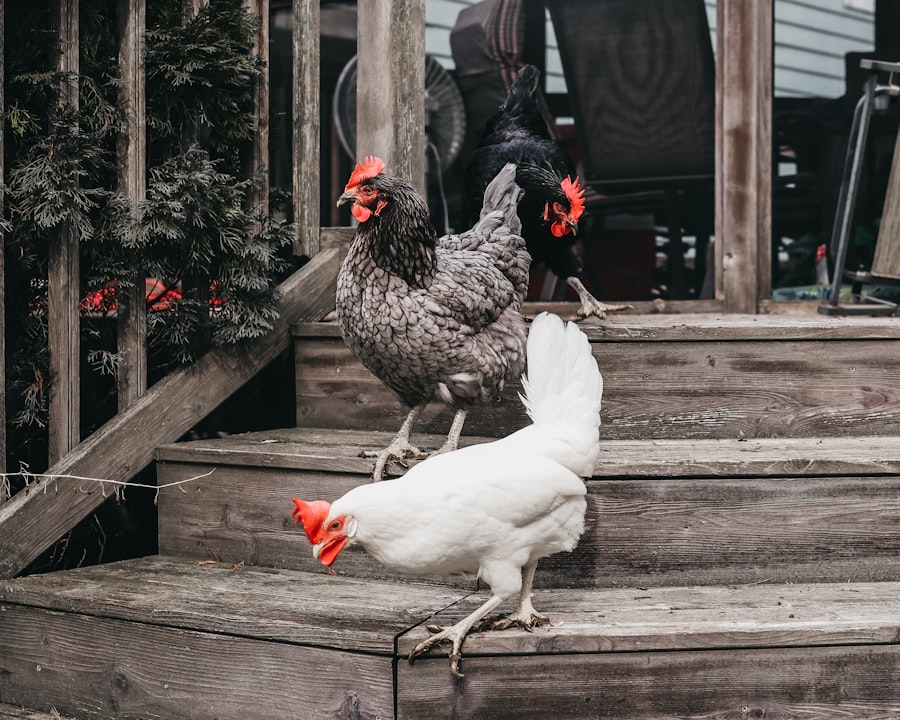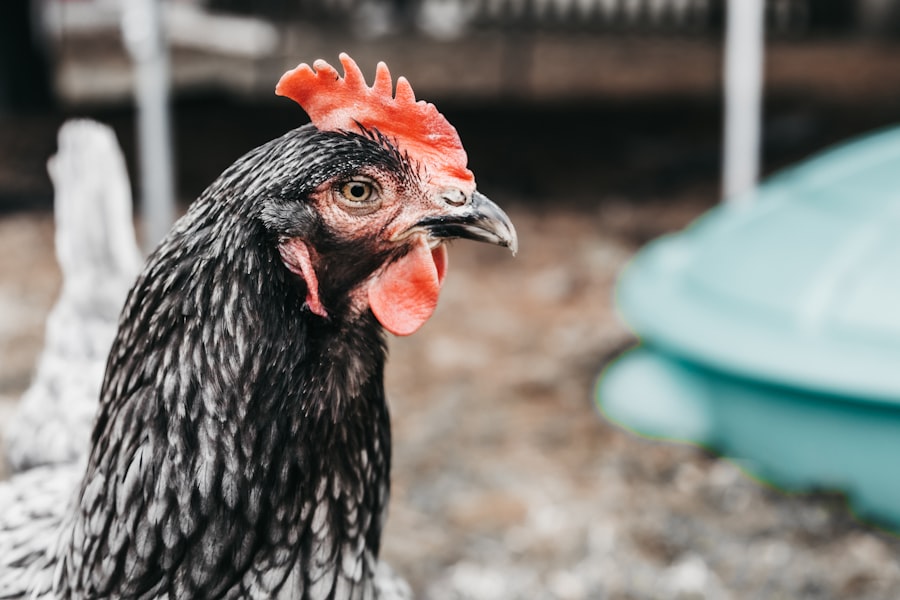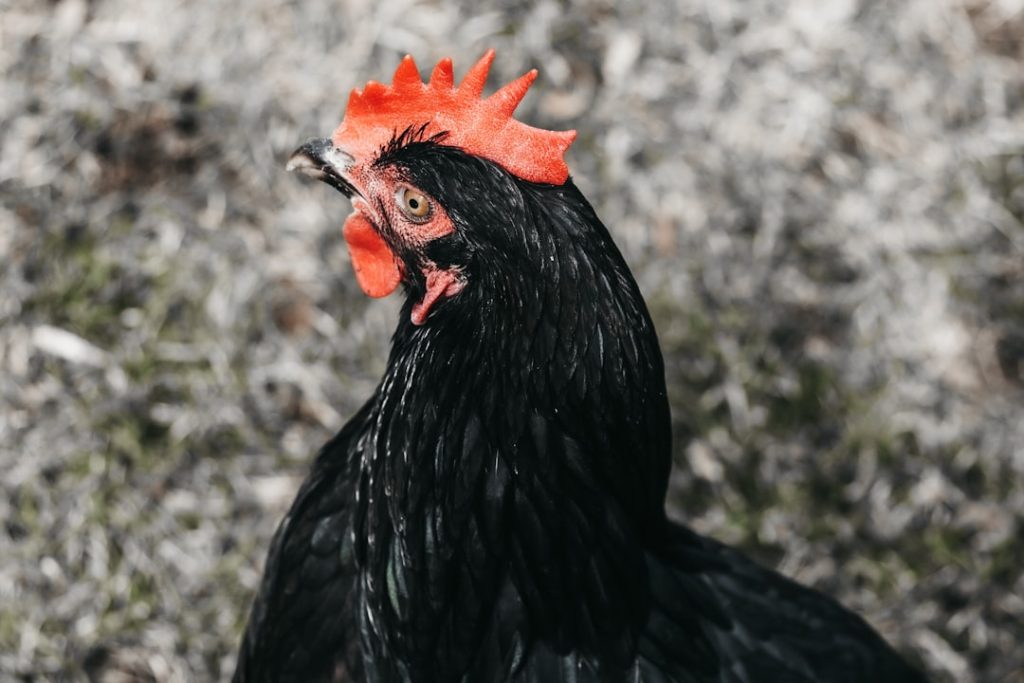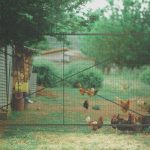Chickens are social creatures with innate behaviors that influence their daily activities and interactions. They possess a natural inclination to scratch and peck at the ground, which is an essential foraging behavior. Within a flock, chickens establish a hierarchical structure known as a pecking order, which determines social dynamics and access to resources.
Roosting is another crucial behavior for chickens, as they instinctively seek elevated perches for nighttime rest. This behavior is rooted in their wild ancestors’ need for protection from ground-dwelling predators. Chickens also exhibit territorial tendencies, particularly when it comes to nesting and egg-laying.
They often select specific areas for these activities and return to them consistently. Chickens are creatures of habit and tend to maintain established routines. If allowed to roam indoors, they may continue this behavior unless provided with designated outdoor areas for specific activities, including elimination.
Understanding these behavioral patterns is crucial for chicken owners to create appropriate living environments and manage waste effectively. Comprehending chicken psychology and natural instincts is fundamental to successful flock management. By accommodating these innate behaviors, owners can create suitable living spaces that promote the health and well-being of their chickens while minimizing undesirable behaviors such as indoor defecation.
Table of Contents
- 1 Providing appropriate outdoor space for chickens
- 2 Creating a designated indoor space for chickens
- 3 Implementing regular cleaning and maintenance routines
- 4 Using deterrents to discourage indoor pooping
- 5 Training chickens to use a specific outdoor area for bathroom needs
- 6 Seeking professional advice for persistent indoor pooping issues
- 7 FAQs
- 7.1 What are some effective ways to keep chickens from pooping in the house?
- 7.2 Why do chickens tend to poop in the house?
- 7.3 Are there any products or devices that can help keep chickens from pooping in the house?
- 7.4 How can I train my chickens to not poop in the house?
- 7.5 What are the potential health risks associated with chickens pooping in the house?
Key Takeaways
- Chickens have natural behaviors and instincts that should be understood and accommodated for
- Providing ample outdoor space for chickens to roam and forage is essential for their well-being
- Designating a specific indoor space for chickens can help manage their behavior and keep them safe
- Regular cleaning and maintenance routines are necessary to keep the chicken coop hygienic and odor-free
- Using deterrents and training techniques can help discourage chickens from pooping indoors and encourage them to use a specific outdoor area for bathroom needs
- Seeking professional advice can be helpful for persistent indoor pooping issues and behavior management
Providing appropriate outdoor space for chickens
Designing the Perfect Outdoor Space
Chickens require a spacious outdoor area where they can engage in natural behaviors like scratching, pecking, and roaming freely. The outdoor space should have a suitable ground cover, such as grass or dirt, to encourage these behaviors and promote a healthy lifestyle.
Providing Essential Amenities
In addition to a suitable ground cover, providing perches and shelters in the outdoor space can give chickens a sense of security and encourage them to spend more time outside. It’s also essential to consider the layout of the outdoor space to ensure that there are designated areas for nesting, roosting, and bathroom needs.
Benefits of a Well-Designed Outdoor Space
By creating a well-designed outdoor space, chicken owners can encourage their birds to spend more time outside and reduce the likelihood of indoor pooping. This, in turn, can lead to a cleaner and healthier living environment for both the chickens and their owners.
Promoting Overall Health and Well-being
Providing an appropriate outdoor space for chickens is not only beneficial for managing their bathroom habits but also for promoting their overall health and well-being.
Creating a designated indoor space for chickens

In addition to providing a suitable outdoor space, it’s important to create a designated indoor space for chickens where they can roost and rest at night. This indoor space should be equipped with perches and nesting boxes to accommodate their natural behaviors. It’s essential to ensure that the indoor space is well-ventilated and free from drafts to provide a comfortable environment for the chickens.
Creating a designated indoor space for chickens can help establish boundaries and reduce the likelihood of indoor pooping. By providing a specific area for roosting and resting, chicken owners can encourage their birds to spend more time outdoors during the day, which can help minimize indoor pooping. Additionally, having a designated indoor space can make it easier to monitor the chickens’ behavior and address any issues related to indoor pooping.
Implementing regular cleaning and maintenance routines
Regular cleaning and maintenance routines are essential for managing indoor pooping issues in chickens. It’s important to keep the indoor and outdoor spaces clean and free from feces to discourage chickens from pooping indoors. This can be achieved by regularly removing soiled bedding, cleaning nesting boxes, and maintaining a clean coop environment.
In addition to regular cleaning, it’s important to implement a maintenance routine that includes inspecting the outdoor space for any potential hazards or areas that may encourage indoor pooping. By staying on top of cleaning and maintenance tasks, chicken owners can create a healthy and hygienic living environment for their birds while also reducing the likelihood of indoor pooping.
Using deterrents to discourage indoor pooping
In some cases, using deterrents can be an effective way to discourage indoor pooping in chickens. There are various commercial products available that are designed to deter chickens from certain areas, such as sprays or powders with strong scents that chickens find unpleasant. These deterrents can be applied to specific areas where indoor pooping is a problem, such as near nesting boxes or roosting perches.
Another effective deterrent is the use of physical barriers, such as wire mesh or netting, to block off areas where chickens tend to poop indoors. By using deterrents, chicken owners can effectively discourage their birds from pooping indoors and encourage them to use designated outdoor areas for bathroom needs.
Training chickens to use a specific outdoor area for bathroom needs

Consistency is Key
Training chickens to use a specific outdoor area for their bathroom needs can be achieved through positive reinforcement and consistency. By consistently directing chickens to a designated outdoor area for bathroom needs and rewarding them when they use it, chicken owners can effectively train their birds to develop appropriate bathroom habits.
Using Visual Cues
One effective method is to place soiled bedding or feces from the indoor space in the designated outdoor area to encourage chickens to use it as their bathroom spot. This visual cue helps the chickens associate the outdoor area with their bathroom needs.
Rewarding Good Behavior
Additionally, providing treats or rewards when chickens use the designated outdoor area can reinforce this behavior and encourage them to continue using it in the future. By rewarding good behavior, chicken owners can create a positive association with the outdoor bathroom area and encourage their chickens to use it consistently.
Seeking professional advice for persistent indoor pooping issues
If indoor pooping issues persist despite implementing various strategies, it may be necessary to seek professional advice from a veterinarian or experienced poultry specialist. A professional can assess the living environment, behavior, and health of the chickens to identify any underlying issues that may be contributing to indoor pooping. In some cases, persistent indoor pooping may be a sign of an underlying health issue or behavioral problem that requires professional intervention.
By seeking professional advice, chicken owners can receive tailored guidance and support to address indoor pooping issues and ensure the overall well-being of their birds. Professional advice can also provide valuable insights into managing chicken behavior and creating an environment that promotes appropriate bathroom habits.
If you’re looking for tips on how to keep chickens from pooping in the house, you might also be interested in learning about the benefits of having a garden chicken coop. This article from Poultry Wizard discusses how a garden chicken coop can provide a natural environment for your chickens while also keeping them contained and preventing them from wandering into the house. Additionally, you can find more helpful information on chicken care and coop size requirements at Poultry Wizard.
FAQs
What are some effective ways to keep chickens from pooping in the house?
Some effective ways to keep chickens from pooping in the house include providing a designated outdoor area for them to roam, using barriers to prevent them from entering the house, and training them to use a specific area for their bathroom needs.
Why do chickens tend to poop in the house?
Chickens may poop in the house due to a lack of outdoor space, feeling threatened by predators, or simply out of habit. It is important to address the root cause in order to effectively prevent this behavior.
Are there any products or devices that can help keep chickens from pooping in the house?
There are products such as chicken diapers and indoor pet gates that can help prevent chickens from entering certain areas of the house. Additionally, training aids and deterrent sprays can be used to discourage chickens from pooping in the house.
How can I train my chickens to not poop in the house?
Training chickens to not poop in the house involves providing them with a designated outdoor area, using positive reinforcement when they use the designated area, and consistently redirecting them when they attempt to enter the house.
What are the potential health risks associated with chickens pooping in the house?
Chickens’ feces can contain harmful bacteria such as salmonella, which can pose health risks to humans if not properly cleaned and sanitized. It is important to prevent chickens from pooping in the house to maintain a healthy living environment.
Meet Walter, the feathered-friend fanatic of Florida! Nestled in the sunshine state, Walter struts through life with his feathered companions, clucking his way to happiness. With a coop that’s fancier than a five-star hotel, he’s the Don Juan of the chicken world. When he’s not teaching his hens to do the cha-cha, you’ll find him in a heated debate with his prized rooster, Sir Clucks-a-Lot. Walter’s poultry passion is no yolk; he’s the sunny-side-up guy you never knew you needed in your flock of friends!







